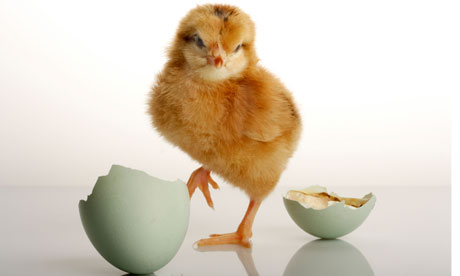Welcome to DU!
The truly grassroots left-of-center political community where regular people, not algorithms, drive the discussions and set the standards.
Join the community:
Create a free account
Support DU (and get rid of ads!):
Become a Star Member
Latest Breaking News
General Discussion
The DU Lounge
All Forums
Issue Forums
Culture Forums
Alliance Forums
Region Forums
Support Forums
Help & Search
Health
Related: About this forumAlice Roberts: why the fertility textbooks will have to be rewritten
http://www.guardian.co.uk/science/2012/apr/08/fertility-easter-alice-roberts
Breaking news: stem cells have been found in human adult ovaries. Photograph: Alamy
Easter is my favourite time of year. I'm not that fussed about chocolate, but if I am going to eat it, I think (probably quite unscientifically) that it does tastes better in egg form. This morning I'll be tucking into toast soldiers and boiled eggs (probably with little pencil-drawn faces on, as that's the way it's always been). Of course the reason I'm eating eggs today is that they are an emblem of fertility and new life, though, at the same time I'm hoping these aren't fertilised ones. Not that I'm worried about developing a chick inside my gut (I remember being particularly worried as a child about swallowing apple pips, in case an apple tree attempted to root and grow inside me); it just seems a bit unpalatable. It might be a bit irrational, but I don't really want to eat tiny chick embryos.
As a mammal, of course, I don't lay eggs. I make them, but I keep them inside me, even when they're fertilised. And, unlike the chicken egg, mine are not yolky and are very, very small (though still the largest cells in the female body and much larger than any in the male. Sorry, men). When a human egg pops out of the ovary each month (unless you're suppressing ovulation by eating hormones, of course), it's a tiny thing, surrounded by a cloud of other cells that cling on to it for a bit. If it's lucky enough to encounter some sperm as it rolls along the fallopian tubes, it may become fertilised, and the fertilised egg will then drift down into the uterus, implant there and start dividing to become an embryo. Pretty soon, it needs to organise something to help it get oxygen and nutrients and get rid of waste. In mammals like us, that something is the placenta, which will bring the embryo's blood very close to maternal blood (while not mixing with it) to exchange gases, nutrients and waste. Then the embryo can keep growing and develop into a foetus. Nine months later, it pops out and starts breathing for itself, filling nappies with waste, but still demanding nutrition from its mum in the form of milk.
So what about this chicken egg? If it had been fertilised and sat on (rather than being refrigerated) it would start becoming a chick embryo, and it would also need to be able to get nutrients and oxygen and to get rid of waste. But it's outside its mother hen's body. Just look at that lovely, yellow yolk, dripping off the end of the finger of toast. It's delicious and nutritious, and that is the point. It's a parcel of nutrients – a packed breakfast, lunch and tea, enough to keep the developing chick going for three weeks, until it's ready to hatch and start finding its own food in the outside world. Somewhere on the surface of that yolk is the cell that equates to my egg: the cell that would divide to form an embryo if it were fertilised.
So this embryo would have plenty of nutrients, but what about waste? What about oxygen? Well, here's the fascinating thing: there's a membranous bag, attached to the gut of the developing chick embryo, called the allantois. This is where the embryo will put its waste as it grows, and it also allows it to absorb oxygen. The membrane surrounding the allantois, full of blood vessels, lies just inside the permeable shell of the egg, and gases diffuse through and get picked up by the chick's blood, which is coursing through all the vessels both inside and outside its body, impelled by the beating of the tiny embryonic heart.
InfoView thread info, including edit history
TrashPut this thread in your Trash Can (My DU » Trash Can)
BookmarkAdd this thread to your Bookmarks (My DU » Bookmarks)
5 replies, 4134 views
ShareGet links to this post and/or share on social media
AlertAlert this post for a rule violation
PowersThere are no powers you can use on this post
EditCannot edit other people's posts
ReplyReply to this post
EditCannot edit other people's posts
Rec (3)
ReplyReply to this post
5 replies
 = new reply since forum marked as read
Highlight:
NoneDon't highlight anything
5 newestHighlight 5 most recent replies
= new reply since forum marked as read
Highlight:
NoneDon't highlight anything
5 newestHighlight 5 most recent replies
Alice Roberts: why the fertility textbooks will have to be rewritten (Original Post)
xchrom
Apr 2012
OP
PDJane
(10,103 posts)1. Delightful stuff, thank you!
There are possibilities inherent in that discovery........
Th1onein
(8,514 posts)2. It will be a long time until I eat eggs again.
Ugh.
Lex
(34,108 posts)3. Spoiler alert.
Chicken eggs make baby chickens.
Th1onein
(8,514 posts)4. DAMN IT! Now, you've REALLY ruined eggs for me!
Who coulda known?
eppur_se_muova
(36,257 posts)5. Whatever you do, try not to think about where they come from. nt